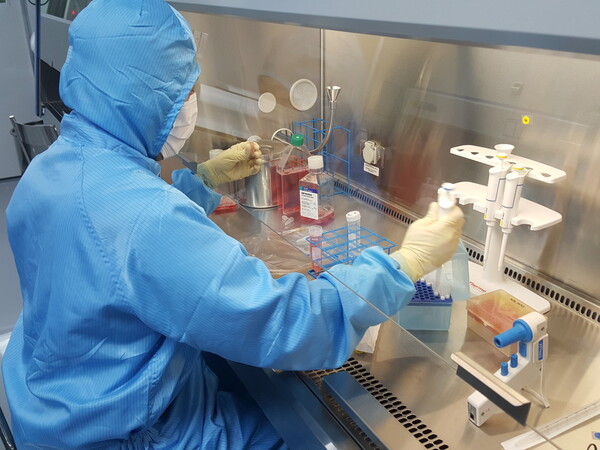NKGen Biotech, the U.S. subsidiary of NKMAX, a Korean natural killer-cell-based immunotherapy company, has moved closer to being listed on the New York Stock Exchange.
NKGen said last Friday (local time) that it has signed a merger contract with Graf Acquisition Corp. IV, a special purpose acquisition company (SPAC) listed on the U.S. Securities and Exchange Commission. The signing came about two weeks after it signed a letter of intent in late March.

The corporate merger between the two companies will likely be completed in the third quarter if it meets all conditions, such as its approval from Graf shareholders, minimum cash requirement, and approval from the SEC. In addition, if NKGen manages to be listed on NYSE through a merger with a SPAC, it will become the first Korean bio subsidiary to do so.
Graf plans to create a fund through PIPE (private investment in public equity) formula, raising money from institutional investors and private equity funds. It must raise at least $50 million (65.4 billion won) for a SPAC merger.
Besides, NKMAX will sign a $25-million backstop contract as the largest shareholder of NKGen, according to a condition that NKMAX buys shares that could not be sold during the listing process of NKGen at $10 per share.
NKGen plans to use the money raised from the IPO for the research and development of clinical trials and operational funds until the second quarter of 2025. When listed, the company expects to be recognized for a corporate value of $160 million.
If the corporate merger is completed according to the contract, Graf will change its name to NKGen Biotech, Inc. Besides, NKGen will be registered as the ticker of “NKGN” on NYSE, NYSE American, and NASDAQ markets.
NKGen is a U.S. subsidiary of NKMAX, established in 2017 and located in Santa Ana, Calif. The company develops clinical trials for NK cell treatments developed by NKMAX.
NKGen is conducting a phase 1 clinical trial for the combination therapy of MSD’s Keytruda (pembrolizumab) and Pfizer’s Bavencio (avelumab) in progressive and metastatic solid cancer patients who have failed in tertiary or more standard treatments in the United States.
In addition, NKGen carries out an open-label phase 1/2 clinical trial in which it administers “AFM24,” an NK cell engager of Germany’s Affimed, and SNK01 in combination therapy. The trial aims to confirm safety, drug resistance, and anticancer activity in progressive and metastatic patients with EGFR mutation.
Besides, NKGen is conducting a phase 1 clinical trial for SNK01 on Alzheimer’s patients in Mexico. The company plans to unveil part of the data in the phase 1 trial at the Alzheimer’s Association International Conference (AAIC) in July.
“The merger with Graf is a crucial stage for our company’s emerging as a front-runner in NK cell treatment,” said Park Sang-woo, founder and chairman of NKGen. “We expect to raise funds to treat neurodegenerative diseases and conduct a clinical trial for cancer.”
Related articles
- NKMAX's NK cell therapy for Parkinson’s scores FDA compassionate use approval
- MD Anderson to use Korean NK-cell therapy in pediatric sarcoma
- What to expect from Korean drugmakers at JP Morgan healthcare meet?
- Patent cliffs, innovative pipeline hunt drive biopharma M&As
- China’s Shoukang Group may become 2nd largest shareholder of NKMax
- NKGen Biotech gets FDA nod to test Alzheimer's NK cell therapy in phase 1/2a trial
- NKMAX's NK cell therapy shows potential as stroke treatment

